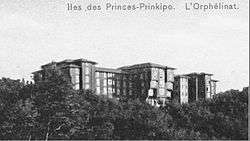Prinkipo Greek Orthodox Orphanage
| Prinkipo Greek Orphanage | |
|---|---|
| Turkish: Prinkipo Rum Yetimhanesi | |
|
Prinkipo Greek Orphanage | |
| Alternative names | Buyukada Orphanage |
| General information | |
| Type | Orphanage |
| Location | Büyükada, Adalar |
| Country | Turkey |
| Coordinates | 40°51′39″N 29°07′24″E / 40.86083°N 29.12333°ECoordinates: 40°51′39″N 29°07′24″E / 40.86083°N 29.12333°E |
| Current tenants | none |
| Construction started | 1898 |
| Inaugurated | May 21, 1903 |
| Technical details | |
| Structural system | Wooden |
| Design and construction | |
| Architect | Alexander Vallaury |
The Prinkipo Greek Orphanage (also known as Prinkipo Palace or Büyükada Greek Orphanage) is a historic 20,000-square-meter wooden building on Büyükada, one of the nine Princes' Islands off the coast of Istanbul, Turkey, in the Sea of Marmara. It is considered the largest wooden building in Europe and second largest in the world.[1][2] It served as an orphanage from 1903 to 1964.[3]
History
It was designed and constructed in 1898 by the late-nineteenth century by the French-Ottoman architect Alexander Vallaury as a luxury hotel and casino for the Compagnie Internationale des Wagons-Lits, the European passenger train company that operated the Orient Express. It was sold in 1903, however, when Sultan Abdul Hamid II would not issue a permit for its operation, and subsequently bought by the wife of a prominent Greek banker, who donated it to the Ecumenical Patriarchate of Constantinople, which operated it as an orphanage. On April 21, 1964, during heightened tension of the Cyprus issue, the orphanage was forcefully closed by the General Directorate of Foundations (Vakif Genel Mudurlugu).[4][5][6] Throughout its history, the orphanage has catered to the needs of 5,744 orphans.[6]
Building
The building is considered to be the largest wooden building in Europe and the second largest in the world (Tōdai-ji Buddhist Temple being the largest). The orphanage consists of 206 rooms, a kitchen, a library, a primary school and vocational workshops.[5] It is situated on top of the Isa Tepesi, a mountain 206 meters high on the island of Buyukada.[5]
Deterioration and repair
Since its closure half a century ago, the neglected building has deteriorated into a state of heavy disrepair.[7] The building was severely damaged by a fire in 1980.[3] The site was included on the 2012 World Monuments Watch and is presently classified as "Rescue Needed" by Global Heritage Network.[8] In April 2012, it was announced that the building would be restored over the next two years to house an international environmental institute.[9]
Legal dispute
The Greek community of Turkey claimed that the Orphanage belonged to the Ecumenical Patriarchate on the basis of Ottoman edicts that granted title to the Patriarchate which was subsequently converted under the Turkish republic. On the other hand, the Turkish government believed that the property does not belong to the Ecumenical Patriarchate. In 2003, the Patriarchate had submitted all required documents to show evidence of its ownership to the Supreme Administrative Court in Turkey. The Supreme Administrative Court dismissed the claims and argued that the foundation had lost its function as an orphanage and has become a seized asset (Turkish: mazbut vakıf).[2] This position adheres with Turkish law which ultimately claims that if a foundation hasn't been of use for more than 10 years, the Directorate of Foundations Council has the right to seize the property.[2] In 2004, The European Union raised the issue in Turkey’s progress report towards accession.[10] In 2010, the case was handed to and resolved by the European Court of Human Rights which ordered the restitution of the building to the Ecumenical Patriarchate becoming the first property title to be returned to a religious minority.[1][4] The legal title is currently in the hands of the Ecumenical Patriarchate who plans to turn the building into a global environmental center, according to the current Greek Orthodox Patriarch, Bartholomew I.[9][11]
Gallery
 Orphans at the dormitory of the Orphanage
Orphans at the dormitory of the Orphanage Orphan students during class session
Orphan students during class session Orphan girls learning to knit at vocational school
Orphan girls learning to knit at vocational school Orphan students with their teacher
Orphan students with their teacher%2C_Istanbul_2.jpg) The Orphanage today
The Orphanage today
References
- 1 2 Preka, Yiota (October 14, 2010). "Turkey Reinstates Legal Title of Prinkipo Orphanage". Greek Reporter. Retrieved 11 January 2013.
- 1 2 3 "The Greek Orphanage in Prinkipo: A case against Turkey in Europe". Hurriyet. 2007-11-26. Retrieved 11 January 2013.
- 1 2 "European Court Tells Turkey to Return Confiscated Greek Orphanage to Patriarchate". Asbarez. June 15, 2010.
- 1 2 RUM ORPHANAGE | World Monuments Fund
- 1 2 3 "Prinkipo Orphanage". Institute of Strategical Thinking. Retrieved 11 January 2013.
- 1 2 Tsitounas, Costas (5.12.2010). "Το καμάρι του Γένους επιστρέφει στο σπίτι του". Espresso (in Greek). Retrieved 11 January 2013. Check date values in:
|date=(help) - ↑ Pictures: 12 World Monuments at Risk
- ↑ GHN Sites
- 1 2 Istanbul: Historic Greek Orphanage to Become Environmental Center Under Patriarch Bartholomew I | Greek Reporter Europe
- ↑ "2004 Regular Report on Turkey’s progress towards accession" (PDF). Brussels: European Union. 6.10.2004. Retrieved 11 January 2013. Check date values in:
|date=(help) - ↑ Koc, Ilyas (9 April 2012). "Greek orphanage to serve as foundation for environment". Zaman. Ankara. Retrieved 11 January 2013.
